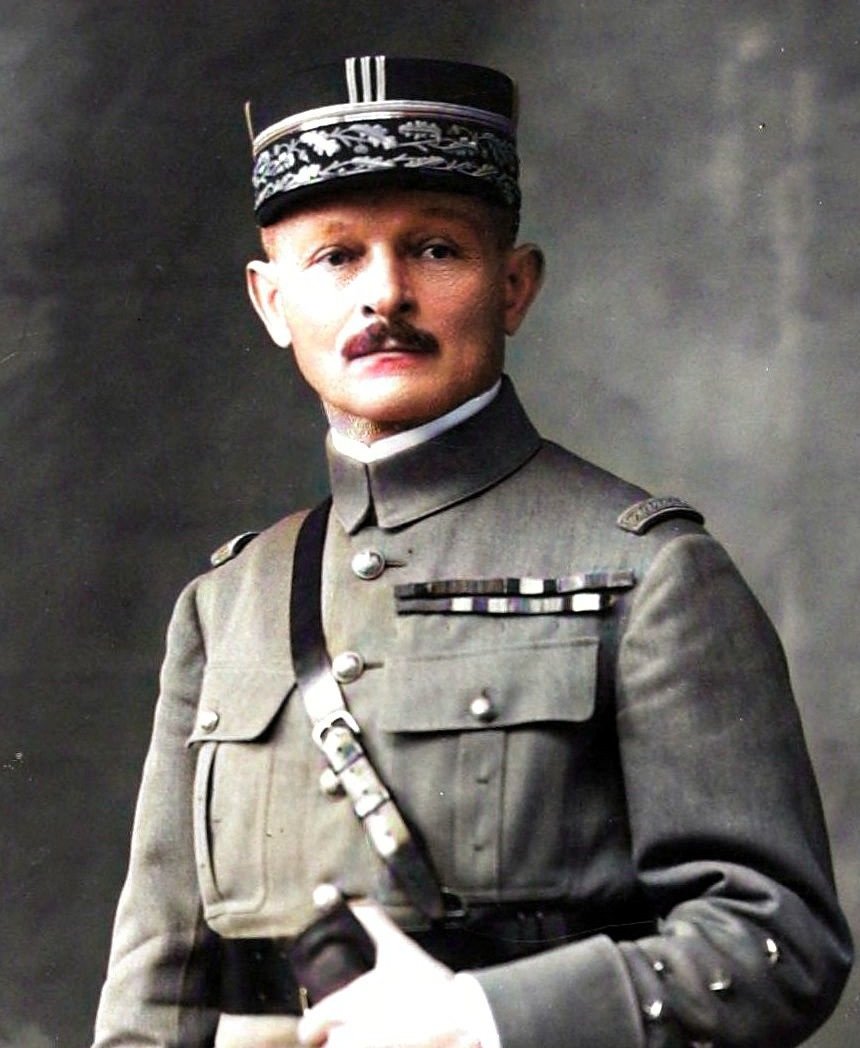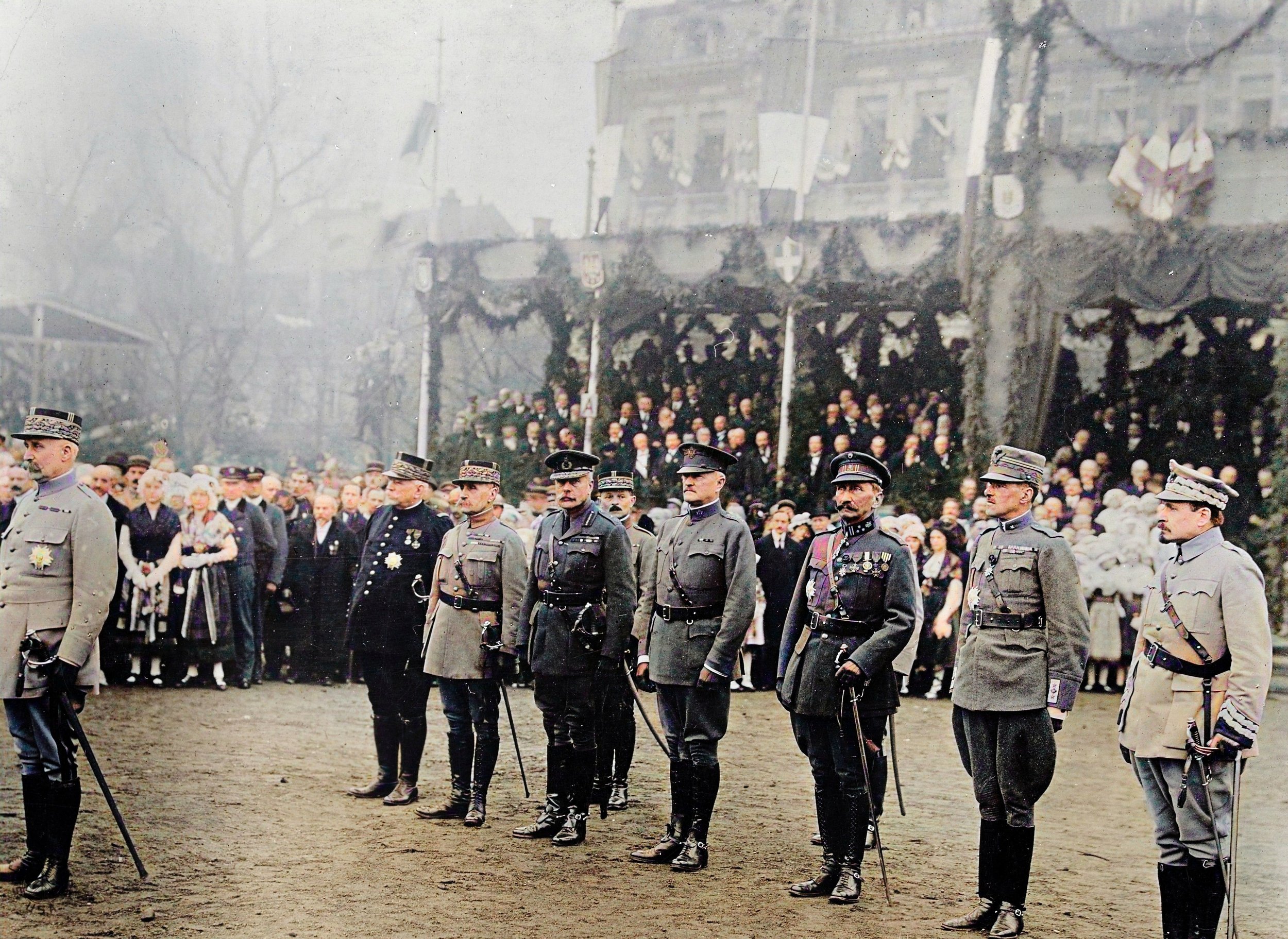Maxime Weygand
“We must finish with all these politicans. They’re all the same, one as bad as another.”
Maxime Weygand was born in 1867 to unknown parents in Belgium, with much speculation on that regard even reaching as far as King Leopold II of Belgium as his father. Regardless, he would claim to ever know his true parentage, and was sent as an infant to France to be raised by a widow in Marseille. He would grow up in different housholds, eventually reaching adulthood and being legally recognized as both a French citizen and adopted son of accountant Francois-Joseph Weygand. His youth otherwise remains mostly unknown.
Weygand with General Foch (left) near the end of the Great War
Weygand would enter the Saint Cyr Military Academy, graduating in 1887 and entering service with a cavalry regiment after further training at the Samur Cavalry School. When the Dreyfus Affair came about (a major scandal within the French Third Republic wherin a Jewish officer was accused of treason, leading to major political shockwaves and tensions between those supporting Dreyfus and those supporting his acuser) Weygand was a staunch supporter of the conviction of Dreyfus, so much so that he was reprimanded by the sympathetic army for writing an article for an anti-Semitic newspaper.
After marrying in 1900, Weygand would serve as an instructor at the Samur Cavalry School, as well as visiting Russia to observe maneuvers as part of the Entente, later expressing dismay at the reluctance of the Russians to share military information.
Several of the top Entente generals stand at a ceremony for the promotion of Phillipe Petain to the rank of Marshal of France (Weygand is standing behind Joffre and Foch, visible between British General Douglas Haig and US General John Pershing)
When the Great War began in 1914 Weygand was serving as a staff officer with the 5th Hussar Regiment, and participated in the Battle of the Frontiers, and was present for the French defeat in the Battle of Lorraine, itself a component of the Battle of the Frontiers.
He would later serve as a staff officer for the French 9th Army, gaining the attention of Marshal Joseph Joffre and later Ferdinand Foch. This meant that in 1917, when Foch was named Army Chief of Staff, Weygand was named a Deputy Chief of Staff, and would later sit on the Entente Supreme War Council as Permanent Military Representative. His First World War service would be capped by his presence to read the terms at the signing of the Armistice of November, 1918, ending the war, as Foch’s aid.
Weygand after his return from Poland in 1920
One of Weygand’s first postings after the end of the war was as an advisor to Poland, at that time resisting an invasion by the nascent Soviet Union. His term here was of little consequence, as the Poles did not consider his input particularly useful, and actively excluded him from much of the major decision making. His impact on the Polish victory remains a subject of some debate.
Weygand (far left) with Prime Minister Daladier (wearing overcoat) and several other senior officers in the 1930s. Marshal Gamelin, whom he would replace in 1940, stands in the center with the lighter colored uniform.
After his return from Poland Weygand would serve in various positions over the next decade. He would serve in the Levant before returning again to France in 1925, and was posted as director of the Center for Advanced Military Studies until 1931. He subsequently became Chief of Staff of the French Army until his retirement in 1935.
Weygand confers with Reynaud and Petain in May of 1940
After trying his hand as a business executive Weygand was recalled to service in 1939 as war loomed, taking a post as commander of French forces in the Middle East. He would remain in that position until May of 1940, as disaster threatened France itself.
He was recalled to the homeland on 17 May, the same day that Marshal Philippe Petain was recalled from Spain to join the faltering government of Prime Minister Paul Reynaud. Weygand was dispatched to replace French Supreme Commander Marshal Maurice Gamelin. This move would have terrible repercussions, as Gamelin had been a staunch supporter of the Republic, unlike either Weygand or Petain. Weygand was slow in actually taking command, leaving the critical situation to worsen yet more before finally attempting Gamelin’s planned counteroffensive. Executed too late, it was another disaster, and by the time of the next phase of the German offensice in early June Weygand was thoroughly demoralized.
German soldiers parade down the Champs-Élysées in June of 1940
German Federal Archives
On 14 June, 1940 Paris fell to the Germans after being declared an open city, the French lines around the capitol having been shattered. The government had hurriedly evacuated to Bordeaux, and by this point Weygand was among several highly placed officials demanding an armistice. Reynaud resigned on 16 June, with Petain taking the reins of the government and appointing Weygand as Minister of War. Soon after an armistice was signed at Compiegne, in the same railcar in the same place as the Armistice of 1918.
Weygand reviews Vichy colonial troops in Algeria
Soon afterward Petain and his clique, including Weygand, dismantled the carcass of the Third Republic, creating a new authoritarian regime that would come to be known simply as Vichy France. Weygand would soon be reassigned to North Africa, where he helped to sway the French military forces their to remain loyal to Vichy rather than Free France. Despite this, he was vehemently opposed to calls to declare war on Britain after the destruction of the French Fleet at Mers el Kebir.
As seen decades prior, Weygand was an anti-Semite, and enacted the Vichy Government’s anti-Jewish laws with enthusiasm, even adding to them in some cases. His programs excluded Jews from universities, as well as targeted foreigners throughout the areas under his authority. He remained ambivalent towards Germany, and opposed the increasingly pro-German stance of Petain’s government as the war continued, although he was at the same time almost slavishly devoted to Petain personally.
Weygand leaves his prison at Schloss Itter in Germany in 1945
Eventually Petain caved to pressure from Hitler to remove the troublesome general, and releived him in late 1941. A year later, as the Americans invaded French North Africa, the Germans took direct control over the Vichy rump state, arresting Weygand and sending him to Schloss Itter in Austria, which was in use as a VIP prison.
Here he was incarcerated with his predessor as French Supreme Commander, General Gamelin, as well as Prime Ministers Reynaud and Daladier and President Albert Lebrun. He would remain here until 1945, when the castle was liberated after a brief fight with an SS unit as Germany collapsed. Notably, the castly was defended from the SS by the French generals, an American Army detachment, and a unit of the German Wehrmacht in what is often considered one of the war’s strangest episodes.
Following his liberation, the Americans turned Weygand over to the Free French, who arrested him for treason as a result of his connections to the Vichy Government. These charges were dropped in 1948, and Weygand would spend the rest of his life in French academia and campaigning for the rehabilitation of the memory of Marshal Petain. He died in 1965, and was denied a military funeral by former Free French leader and current President Charles de Gaulle, although a large crowd attended his funeral regardless, citing his service in the Great War rather than his later activates.









